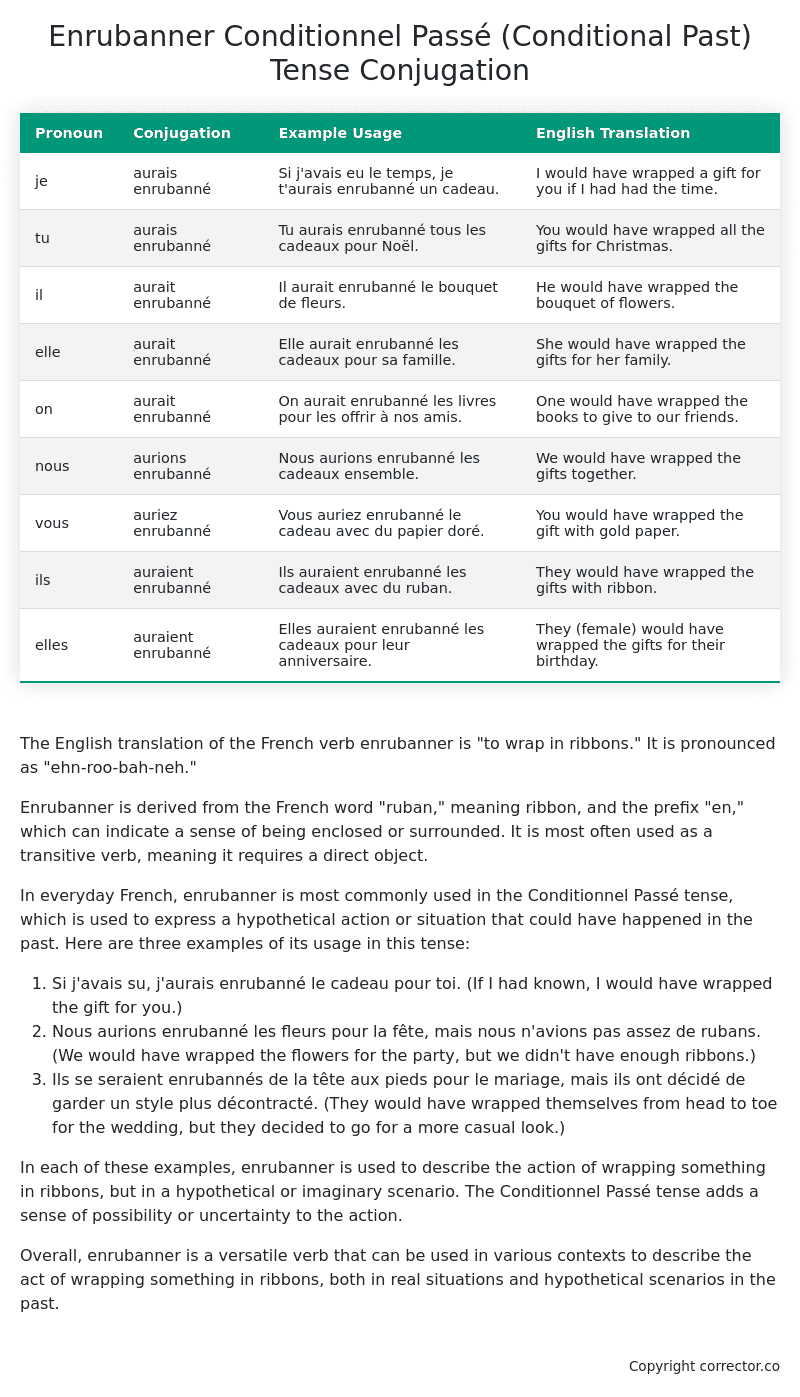Conditionnel Passé (Conditional Past) Tense Conjugation of the French Verb enrubanner
Introduction to the verb enrubanner
The English translation of the French verb enrubanner is “to wrap in ribbons.” It is pronounced as “ehn-roo-bah-neh.”
Enrubanner is derived from the French word “ruban,” meaning ribbon, and the prefix “en,” which can indicate a sense of being enclosed or surrounded. It is most often used as a transitive verb, meaning it requires a direct object.
In everyday French, enrubanner is most commonly used in the Conditionnel Passé tense, which is used to express a hypothetical action or situation that could have happened in the past. Here are three examples of its usage in this tense:
- Si j’avais su, j’aurais enrubanné le cadeau pour toi. (If I had known, I would have wrapped the gift for you.)
- Nous aurions enrubanné les fleurs pour la fête, mais nous n’avions pas assez de rubans. (We would have wrapped the flowers for the party, but we didn’t have enough ribbons.)
- Ils se seraient enrubannés de la tête aux pieds pour le mariage, mais ils ont décidé de garder un style plus décontracté. (They would have wrapped themselves from head to toe for the wedding, but they decided to go for a more casual look.)
In each of these examples, enrubanner is used to describe the action of wrapping something in ribbons, but in a hypothetical or imaginary scenario. The Conditionnel Passé tense adds a sense of possibility or uncertainty to the action.
Overall, enrubanner is a versatile verb that can be used in various contexts to describe the act of wrapping something in ribbons, both in real situations and hypothetical scenarios in the past.
Table of the Conditionnel Passé (Conditional Past) Tense Conjugation of enrubanner
| Pronoun | Conjugation | Example Usage | English Translation |
|---|---|---|---|
| je | aurais enrubanné | Si j’avais eu le temps, je t’aurais enrubanné un cadeau. | I would have wrapped a gift for you if I had had the time. |
| tu | aurais enrubanné | Tu aurais enrubanné tous les cadeaux pour Noël. | You would have wrapped all the gifts for Christmas. |
| il | aurait enrubanné | Il aurait enrubanné le bouquet de fleurs. | He would have wrapped the bouquet of flowers. |
| elle | aurait enrubanné | Elle aurait enrubanné les cadeaux pour sa famille. | She would have wrapped the gifts for her family. |
| on | aurait enrubanné | On aurait enrubanné les livres pour les offrir à nos amis. | One would have wrapped the books to give to our friends. |
| nous | aurions enrubanné | Nous aurions enrubanné les cadeaux ensemble. | We would have wrapped the gifts together. |
| vous | auriez enrubanné | Vous auriez enrubanné le cadeau avec du papier doré. | You would have wrapped the gift with gold paper. |
| ils | auraient enrubanné | Ils auraient enrubanné les cadeaux avec du ruban. | They would have wrapped the gifts with ribbon. |
| elles | auraient enrubanné | Elles auraient enrubanné les cadeaux pour leur anniversaire. | They (female) would have wrapped the gifts for their birthday. |
Other Conjugations for Enrubanner.
Le Present (Present Tense) Conjugation of the French Verb enrubanner
Imparfait (Imperfect) Tense Conjugation of the French Verb enrubanner
Passé Simple (Simple Past) Tense Conjugation of the French Verb enrubanner
Passé Composé (Present Perfect) Tense Conjugation of the French Verb enrubanner
Futur Simple (Simple Future) Tense Conjugation of the French Verb enrubanner
Futur Proche (Near Future) Tense Conjugation of the French Verb enrubanner
Plus-que-parfait (Pluperfect) Tense Conjugation of the French Verb enrubanner
Passé Antérieur (Past Anterior) Tense Conjugation of the French Verb enrubanner
Futur Antérieur (Future Anterior) Tense Conjugation of the French Verb enrubanner
Subjonctif Présent (Subjunctive Present) Tense Conjugation of the French Verb enrubanner
Subjonctif Passé (Subjunctive Past) Tense Conjugation of the French Verb enrubanner
Subjonctif Imparfait (Subjunctive Imperfect) Tense Conjugation of the French Verb enrubanner
Subjonctif Plus-que-parfait (Subjunctive Pluperfect) Tense Conjugation of the French Verb enrubanner
Conditionnel Présent (Conditional Present) Tense Conjugation of the French Verb enrubanner
Conditionnel Passé (Conditional Past) Tense Conjugation of the French Verb enrubanner (this article)
L’impératif Présent (Imperative Present) Tense Conjugation of the French Verb enrubanner
L’infinitif Présent (Infinitive Present) Tense Conjugation of the French Verb enrubanner
Struggling with French verbs or the language in general? Why not use our free French Grammar Checker – no registration required!
Get a FREE Download Study Sheet of this Conjugation 🔥
Simply right click the image below, click “save image” and get your free reference for the enrubanner Conditionnel Passé tense conjugation!

Enrubanner – About the French Conditionnel Passé (Conditional Past) Tense
Formation
Common Everyday Usage Patterns
Expressing Unreal Past Scenarios
Polite Requests or Suggestions
Expressing Doubt or Uncertainty
Interactions with Other Tenses
Conditional Present
Indicative Past Tenses
Conditional Future
Summary
Want More?
I hope you enjoyed this article on the verb enrubanner. Still in a learning mood? Check out another TOTALLY random French verb conjugation!


